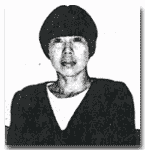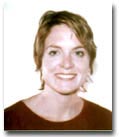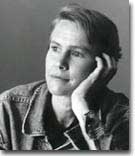
This section will feature contemporary poetry -- and accompanying poetics/essay/ journal writing, when possible -- translated into English from other languages. If you are translating work, please propose your ideas to our on-going translation coordinator: Cole Swenson, <xoxcole@cs.com>
featuring Poems by Ayane Kawata
Translation and Preface by Malinda Markham
 "Suite
for Nell," a phototransfer collage by Susan L. King
"Suite
for Nell," a phototransfer collage by Susan L. King
(Click on artwork to see full-size version)
PREFACE by Malina Markham
In Japan, Kawata's work is noted primarily for its stark, vivid depictions of life -- not so much life as lived by a specific person, but more the sense of "living-ness." To the Japanese eye and ear, Kawata's poetry cuts through to the "overwhelming mysteries" that lie beneath everyday activities, and it does so with necessity. Hers are aggressive poems that look frankly at what it means to be a Japanese woman both inside Japan and away. Although she uses traditional natural images such as skylarks and lilies, her work is permeated just as often with elements of the body. Constant images of blood, ovaries, and physical decay, combined with a sensibility that verges on surrealist, undercut the typically quiet, "submissive" exterior that we usually associate with the public persona of Japanese women.
Time of the Sky is comprised wholly of very short poems reminiscent of tanka and haiku. In an interview, Kawata states that when she was writing the book, she chose an abstract title because she couldn't connect language with the concreteness of actual experience. Although she expected never to be able to write longer poems, Kawata expanded into free verse and short prose poems after moving to Italy. Her writing style began to include Western images, especially of art and cityscape, although primary themes of isolation and anger, and images of objects bursting into flame, remained. One of the challenges of translating her shortest poems is expressing the feeling of accretion that arises when reading a whole body of her work. Certain emotions and images occur so frequently that they gain power and connect closely enough that I decided to group three short, numbered poems under one title, chosen by myself. The individual poems and the numbering remain true to her work in Selected Poems, published by Shichosha Publishers in 1994.
#18
Everywhere on the
slope,
Stray dogs wander about.
The dawn lays eggs of sudden birds.
#68
The sky does not
scream.
From inside the blank paper, sheep silently open their eyes.
#80
Doves flutter as
they rot:
How far will they extend summer's table?
#78
No direction:
While drowning
countless skylarks,
The
blood dreams.
#3
The pure window
From the inside
From the inside
Throw it open:
Gaily
the scream must scamper away.
# 57
The fur, swimming
in the sky,
The flock of
innocent lips:
From where
did they come?
Egg & Lily
#11
Tumbling down in
despair, mincing the scenery:
Is
that a wound? An ear? A yellow lily?
#4
Don't call out!
Don't bundle
up the yellow lilies flitting about!
Don't
prick up your ears to the egg!
#61
To assault tomorrow:
Transparent
music like flesh
From inside
an egg-
To the cloud,
To the fish,
Until becoming
a seed.
#13
The woman who drank
a glass window will shudder at dawn.
She
trembles to the fingertips, right?
#65
Where did the birds
hide?
It isn't time.
I make the
sky's crystal
Inside
my own pulse.
#30
At the speed of the
blood's reed crawling far to the brain:
Please sing
as if attacking.
At the hotel entrance
was a boneless
woman.
Holding both
shoes in one hand, she waited inside.
A summer kimono
dyed with Japanese characters
had been left
in the room
where dark
lace hung down, rotting.
The
characters are suffocating.
Once, at the seashore,
round white
stones touched quietly, nonchalant,
and a wave
cut the scene.
I gathered
a stone the size of a dog's face
and placed
it in my bag.
In another
town,
I threw
it away.
On August 10th
at Lake Biwa,
I stay at a
hotel with a man.
(a)
In the dark sky, a small substance is scattered and arranged into a ring. Like the sides of a walnut, two adjoined things become one. I can make out K.'s head and the head of his wife. Guilt flows to the back of my mind. Still, a feeling of defeat.
(b)
Daybreak, is it? In the middle of dawn, I see the lily bud swell. In space, two life-size lily buds-sigh heavily, and swell.
White Clouds
Did the white clouds eddy or boil up? I wonder, and the figure of a large swan emerges, writhing as if in pain. Afterward, a flock crossing the sky one by one becomes the clouds' streaming. One line of transparent thread gleams and is guided along. Still, the downpour, unstained, drifts off.
I lie on my side in a box surrounded by a thin white wall and can see signs of I.'s coming. My desire for I. is not hidden, but soon I will consign it perfectly to my chest.
 BIO
of poet: Ayane Kawata,
a female Japanese poet, was born in China in 1940. She published her first
book, Time of the Sky, in 1969 and has published at least seven
other books, including Selected Poems, from which these poems have
been taken. In the summer of 1969, Kawata traveled to Italy to pursue
studies in art and has lived there and throughout Europe ever since. Despite
her multi-lingual background, she writes poetry exclusively in Japanese.
BIO
of poet: Ayane Kawata,
a female Japanese poet, was born in China in 1940. She published her first
book, Time of the Sky, in 1969 and has published at least seven
other books, including Selected Poems, from which these poems have
been taken. In the summer of 1969, Kawata traveled to Italy to pursue
studies in art and has lived there and throughout Europe ever since. Despite
her multi-lingual background, she writes poetry exclusively in Japanese.
 BIO
of translator:
Malinda Markham spent the 1996-97 academic year at Saga University
on a fellowship from the Japanese Ministry of Education and hopes to return
to Japan in the spring of 2000. This year, her poetry has been published
or is forthcoming in the journals Conjunctions, VOLT, American Letters
& Commentary, Paris Review, Ohio Review, and Rhizome.
BIO
of translator:
Malinda Markham spent the 1996-97 academic year at Saga University
on a fellowship from the Japanese Ministry of Education and hopes to return
to Japan in the spring of 2000. This year, her poetry has been published
or is forthcoming in the journals Conjunctions, VOLT, American Letters
& Commentary, Paris Review, Ohio Review, and Rhizome.
 Cole
Swenson -- Translation Coordinator
Cole
Swenson -- Translation Coordinator
Cole Swenson is a poet and translator of contemporary French poetry. Her translation of Olivier Cadiot's Art Poetic was published this year by Sun & Moon Press. Recent volumes of her own work include Try (University of Iowa Press, 1999) and Noon (Sun & Moon Press, 1997). She currently directs the Creative Writing Program at the University of Denver.
go to this issue's table of contents





